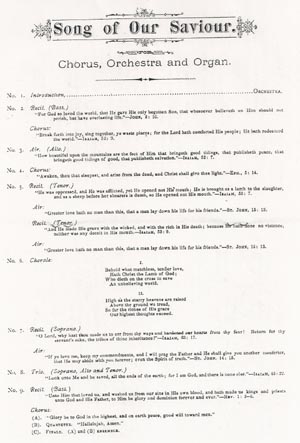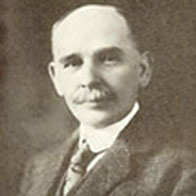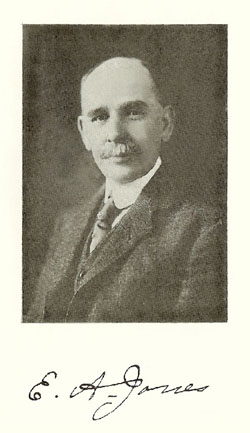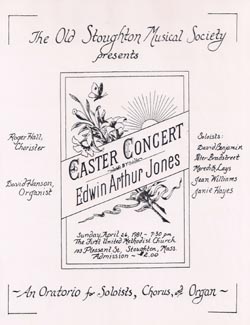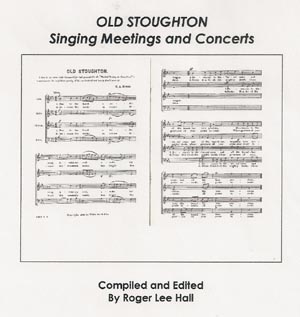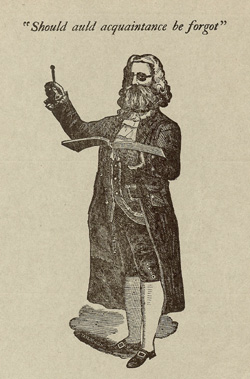
World Premiere Recording
of a major choral cantata -
now available on a CD!
Composed by Edwin Arthur Jones (1853-1911)
"one modest man who knows the power of music."
-- Edward Everett Hale
- SONG OF OUR SAVIOUR - World Premiere Performance of Cantata in 1992
- EASTER CONCERT -- An Oratorio by E.A. Jones (AMRC CD 0030)
- E.A. Jones: His Life and Music (interview and music)
- Praise to E.A. Jones from Edward E. Hale
- More Information
World Premiere of a Dramatic Cantata
edited and conducted by Raymond Fahrner
Evolution of the cantata (1879-1881)
Jones had completed his preliminary choral work which he called " Nativity Hymn" in 1879 and submitted it for a nationwide music competition in Ohio.
Only three works received honorable mention in the Cincinnati College of Music competition, judged by Theodore Thomas, the most distinguished conductor in America at that time. He wrote the following statement:In August of 1881, Jones completed his revised version of an earlier choral work and retitled the cantata:
Song of Our Saviour
It was to be his crowning achievement in music.
World Premiere Performance in 1992
From a local newspaper story:
The Stoughton Journal article gave this announcement:
"On Sunday, May 3, the Old Stoughton Musical Society will conclude its 206th concert season with the world premiere of the piece...The long-lost cantata was discovered in 1980, wrapped in an unmarked brown paper package in the basement of the Stoughton Historical Society.According to, Raymond Fahrner, director of the musical society, he said it was "a landmark of 19th century American music written in the Romantic style of Brahms and Wagner. It is distinguished by its beautiful melodies, rich and varied harmonies and colorful, dramatic use of the orchestra."
The World Premiere performance was held at St. James Church in
Stoughton, Massachusetts.The soloists for the premiere performance in 1992 were:
Linda Brookfield, soprano
Donna Ames, alto
Michael Duarte, tenor
Mark Anderson, bassRichard Hill, organist
The Old Stoughton Musical Society Chorus and Orchestra, was conducted by Dr. Raymond Fahrner, who spent considerable time preparing the cantata for this performance.
Boston Globe article:
There was an article about this World Premiere performance in the Boston Globe newspaper, "Giving life to a lost masterpiece," by William A. Davis on May 4, 1992.
The article credits musicologist Roger Hall, who is also the Jones biographer and a composer too, with discovering the Jones manuscript music at the Stoughton Historical Society back in 1980.
The article mentions that "standing out among the trove of songs and string quartets that Hall unearthed was Jones' undoubted masterpiece: a cantata entitled 'Song of Our Saviour' that has been compared to the best of Brahms."
Patriot Ledger newspaper article:
In this newspaper review, Ken Keuffel Jr. quoted Raymond Fahrner as saying:
"The composer has a great sense of melody. It was well-orchestrated. For a young man (of 28 years old), it was an extraordingary achievement."Stoughton Journal newspaper article:
"Good News!
Old Stoughton Musical Society presented a breathtaking 'Song of Our Saviour'...The 19th century cantata for chorus, orchestra and organ was written by Edward Arthur Jones, local civic leader and composer...It was clearly obvious that many hours went into the performance. The group deserved the standing ovation it received.
Now available on its 30th anniversary...
The complete cantata from the World Premiere performance on May 3, 1992
with soloists, chorus, organ and orchestra is now available on a CD (AMRC 0029).
Here are the sections of the Song of Our Savious cantata:
No. 1: Introduction - Orchestra
No. 2a: Recitative - "For God so loved the world" (John 8:16) - Bass soloist
No. 2b: Chorus - "Break forth into joy" (Isaiah 52:9) - Chorus
No. 3: Air - "How beautiful upon the mountains" (Isaiah 52:7) - Alto soloist
No. 4: Chorus - "Awaken thou that sleepest" - Eph. 5:14)
No. 5a: Recitative - "He was oppressed" - Isaiah 53:7 - Tenor soloist
No. 5b: Air - "Greater love hath no man" - St. John 15:13 - Tenor
No. 6: Chorale - "Behold what matchless, tender love" - Chorus
No. 7a: Recitative - "O Lord, why hast made us to err" - Isaiah 63:17 -
Soprano soloistNo. 7b: Air -"If ye love me, keep my commandments" - St. John 14:15 -
Soprano soloistNo. 8: Trio - "Look unto Me and be saved" - Isaiah 45:22
- Trio for Soprano, Alto, TenorNo. 9a: Recitative - "Unto Him that loved us" - Rev. 1:5-6 - Bass soloist
No. 9b: "Glory be to God in the highest" - Chorus
No. 9c: "Hallelujah, Amen" - Solo Quartet
No. 9d: Chorus and Solo Quartet (Finale)
Click the link in the box below to hear three excerpts from this cantata and here are the texts:
No. 3: for Alto soloist with orchestraHow beautiful upon the mountains are the feet of Him that bringeth good tidings, that publisheth peace, that bringeth good tidings of good, that publiseth salvation -- ISAIAH 52:7
No. 6: Chorale for chorus
Behold what matchless, tender love,
Hath Christ the Lamb of God;
Who dieth on the cross to save
An unbelieving world.High as the starry heavens are raised
Above the ground we tread,
So far the riches of His grace
Our highest thoughts exceed.
No. 8: for Soprano, Alto, Tenor soloists, organ and orchestra --
Look unto me and be saved, all the ends of the earth; for I am God, and there is none else. -- ISAIAH 45:22
To inquire about ordering your copy of the complete cantata
of the World Premiere Performance from 1992
on a CD or from a download by Dropbox-- click here
Edwin Arthur Jones (1853-1911) was one of Stoughton's most distinguished past citizens.
He completed his greatest music masterpiece in 1881, and yet his Song of Our Saviour cantata was never performed during his lifetime.
After more than a century, it was discovered by musicologist, Roger Hall, and given its first complete performance in 1992.
At that time, Jones was given his proper recognition as Stoughton's most accomplished music man from the 19th century.
As the famous 19th century Boston author, Edward Everett Hale, wrote about E.A. Jones,
he was -- "one modest man who knows the power of music."

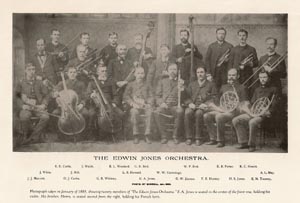
© 1984 - picture from
E.A. Jones: His Life and Music
by Roger L. Hall
Now available on a computer disc or USB Flash Drive:
E.A. Jones: His Life and Music
with the complete original booklet
including
a catalogue of Jones music
plus
examples of his choral and chamber music
and
an audio interview from 1980
with two women
who knew E.A. Jones:
Anne Capen Peterson
and Viola (Pearl Holmes) Wigmore
To order your copy of this informative computer disc or USB Flash Drive
about one of the most accomplished
19th century Massachusetts composers,
write to PineTree Productions -- click here
World Columbian Exposition in Chicago in 1893
Thanks to the efforts of E.A. Jones, the Stoughton Musical Society was the only musical organization to perform early American choral music ("Ancient Music" on the poster) in Chicago in August of 1893.
The E.A. Jones Orchestra accompanied the chorus of 100 singers in Colonial dress.
Several thousand people heard them perform, a larger audience than for the symphony concerts.See the list of music performed at the Chicago World's Exposition -- click here

Read about the Edwin Arthur Jones oratorio,
with soloists, chorus and organ,
conducted by Roger Hall and Earl Eyrich,
EASTER CONCERT (1890) --
on AMRC CD 0030

Praise From A Famous Boston Author
The distinguished writer and clergyman Edward Everett Hale, wrote a description of a Sunday concert. He wrote::
For two hours an orchestra, such as he had seldom heard, rendered with dignity and feeling some of the best music of the noblest composers...more than fifty years ago the musical society of this village was gathered and incorporated. That has probably helped in building up the taste of this town. But in our generation one modest man who knows the power of music has organized this grand orchestra.
Nobody pays them, nobody pays him, except the good God. ..This man was the leader, whom you saw. If he had not been too modest, you would have heard one of his own compositions. I dare say you have heard them in New York or in Cincinnati. I wanted you to see this, so soon as you asked what was possible in a community of five hundred people.
He then explained what his description was based on:
I have here attempted to describe the interesting musical service which is carried on in the town of Stoughton, in Norfolk County, in Massachusetts ...I have but described in this chapter, as well as I can, the service which the people of this town render regularly under the leadership of Mr. Edward [Edwin A.] Jones.
-- Edward E. Hale, Mr. Tangier's Vacations (Boston, 1888),
pages 45-46.
The information on this page was compiled from the following articles and books by E.A. Jones biographer, Roger Lee Hall, who has researched this music for the past four decades:
More Information:
- Booklet: E.A. Jones: His Life and Music (PineTree Press, 1984)
- "DEDICATION" - A Guide to Singing Meetings and Concerts in Stoughton,
1762-1992
- Singing Stoughton - Music from America's oldest choral society
- Stoughton Music Heritage Series
American Music Recordings Collection (AMRC)
Contact information -- click here
Please Help Support
the educational mission
of the
Center for American Music Preservation (CAMP).
Order music titles at the

© 2012-2024 PineTree Productions. All Rights Reserved for original information on this website.
Contact: pinetreepro@aol.com
.




